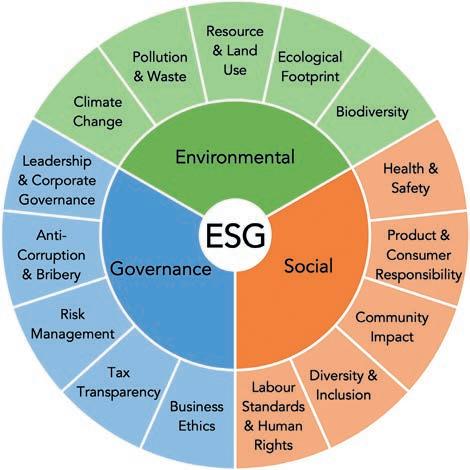
4 minute read
ESG is Here to Stay
Environmental, Social and Governance (ESG) has been brought into sharper focus by recent global events such as climate change and the COVID-19 pandemic. Here’s how businesses can create sustainable models that have ESG principles at their core. – By David Powell
ESG is fast becoming the phrase of the moment and a corporate imperative. Most organisations, if they haven’t already, are busy building Environmental, Social and Governance principles into their business and operating models and communicating these to internal and external stakeholders. Evolution Partners has identified the following critical factors within the overall ESG framework from our work supporting clients to develop their ESG Roadmaps:
Advertisement

At the macro-level, the United Nations, World Bank and other supranational organisations are looking to drive change by influencing governmental legislative and environmental policy. The European Union’s introduction of a taxonomy to classify environmentally sustainable economic activities, the UK government’s issuing of standards for asset managers within the sustainable investment sector, and the anticipated support of Biden’s administration on ESG investing are just some examples of this global trend. At the micro-level, organisations are being driven towards more responsible business models by internal (e.g. employees) and external pressures (e.g. customers; shareholders; and institutional investors, such as Blackrock, Vanguard and State Street). As a consequence, individual firms are adapting to meet demands for transparency regarding their contribution to environmental and social progress, and asset managers are transitioning towards sustainable finance to cater to the preferences of their stakeholders, with ESG filters becoming commonplace in investment portfolios.
Recent global events, including climate-related forest fires in Australia and the United States, and the global response to the COVID-19 pandemic, have ESG sharply in focus. As the world looks to deal with these and future challenges, it is clear that the current emphasis on responsible business practices isn’t going away, and sustainable business models need to have ESG principles at their core.
ESG and the corporate world
At Evolution Partners, we recognise the transformative impact ESG is having on the corporate world and the benefits available to companies that develop a strategic approach to ESG. These include opportunities to:
• Improve business operations and productivity by rectifying inefficiencies;
• Reduce costs and increase profit margins;
• Mitigate risk;
• Strengthen sustainability;
• Improve stakeholder satisfaction;
• Develop ties with the communities in which businesses operate; and
• Gain and maintain a competitive advantage.
We are also aware, however, of the challenges involved in integrating ESG considerations into core business and investment strategies.
From an investment perspective, there are complexities of balancing the three ESG components, inconsistencies between data providers of metrics, and geographical differences in regulations.
From a corporate perspective, challenges include ensuring a top-down embrace of an ESG-centric philosophy, long-term sponsorship and leadership of ESG projects, and a company-wide cultural shift. The geographical location of business operations may also impact companies’ ESG strategies due to differences in regulations and the perceived importance of ESG factors.
The benefits offered by a strategic approach to ESG, however, make rising to face these challenges well worth the time and effort.
ESG and Evolution Partners
When we speak about ESG, we speak from experience. Evolution Partners has designed a methodology to help organisations satisfy external and internal ESG needs and requirements.
We formulated our own roadmap for integrating ESG into our corporate culture, establishing targets and metrics to ensure we monitor our progress and achieve our long-term ESG objectives. As a result, we are proud to say that we are now a carbon-negative company.
We have also recently supported a global consumer goods company in creating an ESG strategy for its Asia-Pacific business. It already had a global ESG strategy in place, but it needed to be tailored to the APAC region’s operations to ensure that its initiatives are actionable and measurable and its targets achievable.
We benchmarked the company’s global ESG strategy against competitors and peers, enabling us to determine our client’s relative position within the marketplace, identify areas for improvement, and prioritise specific initiatives to be implemented across the Asia-Pacific region. The final output was an actionable and measurable roadmap that enabled our client to implement ESG initiatives across its APAC locations and was well-received by the company’s Asia-Pacific management team.
Looking to the future
Going forward, companies are likely to be judged by all stakeholders on how they address ESG concerns. The call for businesses to protect the environment, support their communities, and create inclusive opportunities is louder than ever.
Companies operating across all industries need to develop a strategic approach to ESG in order to unlock opportunities to create value, effectively manage risk, and remain relevant in an increasingly competitive environment.
Evolution Partners is here to help. Regardless of your size, we will assist you in incorporating ESG considerations into your core operating model to help you achieve your overall business objectives – whether that be aligning local operations with your global ESG strategy or developing an ESG roadmap from scratch.
We encourage businesses to act – ESG is a core part of your future success.
Co-written by Hannah Smyk and Nobel Basser





